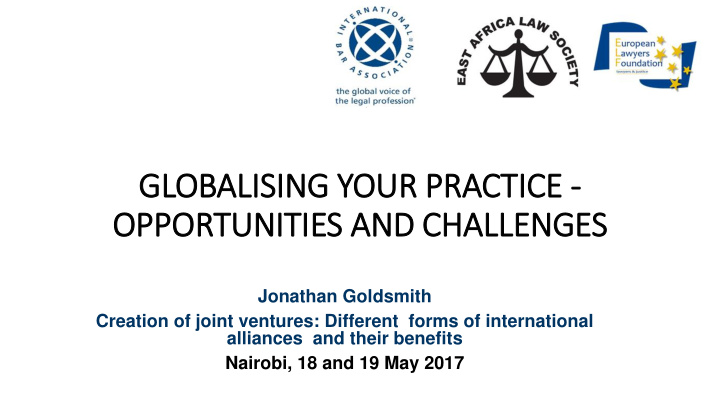



GLOBALISING YOUR PRACTICE - OPPORTUNITIES AND CHALLENGES Jonathan Goldsmith Creation of joint ventures: Different forms of international alliances and their benefits Nairobi, 18 and 19 May 2017
Why cooperate? For foreign law firms • provide services they cannot, or do not want to, provide – e.g. to support investment, debt financing, infrastructure projects, as part of regional advice (e.g. to a client wanting to do something with EAC and needing advice on all EAC members) etc • in order to advertise to clients they have a pan-regional offering For East African law firms • access to new clients/branding • economies of scale/sharing back office • sharing of experience/technology transfer
Forms of f cooperation Individual lawyers • Employment of a foreign lawyer/by a foreign lawyer • Partnership with foreign lawyers Law firms • Marketing cooperations (e.g referral networks ie. Lex Mundi, best friends) • Law Firm Networks and Alliances (e.g. DLAPiper/ENSafrica networks) • Partial integration models (joint ventures, vereins etc) • Full mergers
Regulatory ry issues • Which foreign lawyers? (e.g. WTO list versus approved list etc) • To do what? (e.g. full/limited licences) • What kind of structures? (e.g. partnership, limited liability, ABS etc) • Approval processes • How to maintain regulatory oversight and to what level? – regulatory/disciplinary recognition agreements with home country bars? • Insurance/social security/compensation fund contributions • Fees • Code of Conduct application and challenges e.g. names of firms • Mix of domestic regulation and international rules (e.g. WTO, trade agreements)
World Trade Organisation • The General Agreement On Trade In Services (GATS) covers trade in legal services • EALS member countries have been members of the WTO since 1995/6 • Only Rwanda has made a commitment on legal services • IBA GATS handbook • IBA resolutions
Models (1 (1) IBA resolution on transfer of skills: • ‘WHEREAS the extent and the modalities of Skills Transfer in cross -border legal services by Foreign Lawyers in a given Host Jurisdiction necessarily depend, inter alia, on the extent to which Foreign Lawyers in such Host Jurisdiction are permitted to practice law and to associate with Local Lawyers; • WHEREAS a regime permitting the association of Foreign Lawyers with Local Lawyers likely provides the most efficient and effective means of Skills Transfer by permitting Local Lawyers to work with more experienced Foreign Lawyers within the same firm, thus enabling them to gain practical experience and substantive knowledge in a way that would otherwise be impermissible due to the risk of breach of confidentiality’
Models (2 (2) IBA resolution on transfer of skills (contd.) • ‘(B) A Foreign Lawyer who is permitted to practice through an establishment in a Host Jurisdiction in association with Local Lawyers may be required, in the course of his/ her practice, to provide, directly or indirectly, individual training and mentoring in relevant legal skills and disciplines, as well as supervised work experience, to Local Lawyers with whom the Foreign Lawyer practices in such association.’
Models (3 (3) EU lawyers’ establishment directive (98/5/EC), Article 11 • ‘(3) The host Member State shall take the measures necessary to permit joint practice also between: (a) several lawyers from different Member States practising under their home-country professional titles; (b) one or more lawyers covered by point (a) and one or more lawyers from the host Member State. The manner in which such lawyers practice jointly in the host Member State shall be governed by the laws, regulations and administrative provisions of that State.’
Next xt steps • IBA handbook nearly ready to guide bars through the problems • What are your views? • Thank you!
Recommend
More recommend